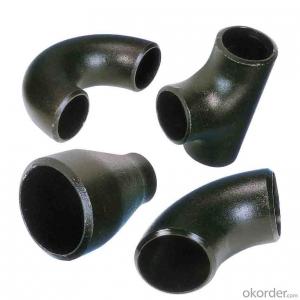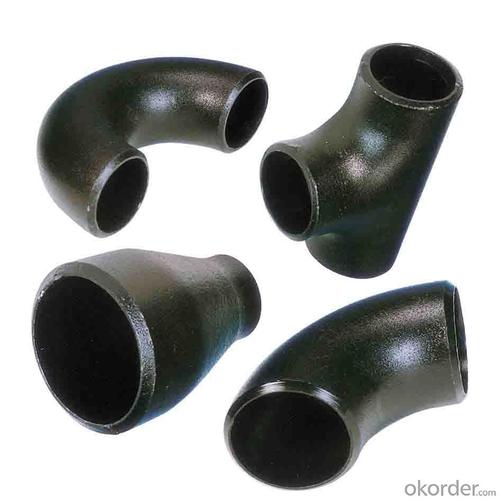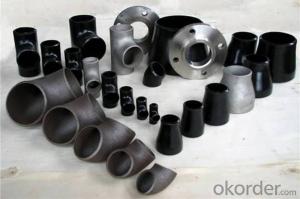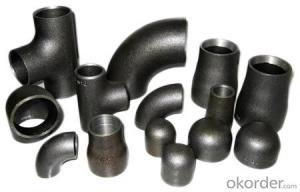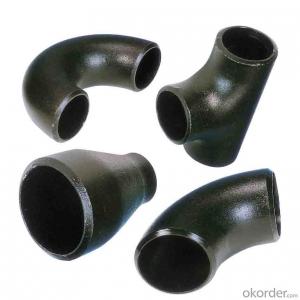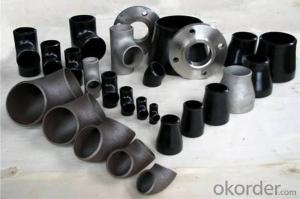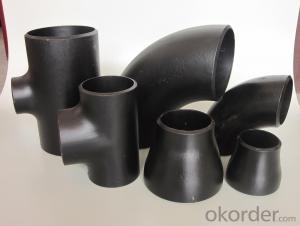64'' ELBOW TEE BEND FLANGE CARBON STEEL FITTINGS
- Loading Port:
- Tianjin
- Payment Terms:
- TT OR LC
- Min Order Qty:
- 5 m.t
- Supply Capability:
- 300 m.t/month
OKorder Service Pledge
OKorder Financial Service
You Might Also Like
Products Detailed Description
Products | pipe fittings elbows, bends,tees, reducers caps |
Size | 1/2" - 48" |
Wall thickness | Sch5-Sch160 XXS |
Standard | ANSI, ASME API5L, OCT, DIN and JIS, etc. |
we can also produce according to drawing and standards provided by customers. | |
Material | Carbon steel, alloy steel and stainless steel. |
We can produce according to materials appointed by consumers. | |
Packaging | Plywood Cases,plywood pallet, plastic bag or as customers requirement |
Surface Treatment | Shot blasted, rust-proof black oil |
Delivery Time | 10-60 days |
Quality | First grade |
Others | 1.Special design available according to your drawing. |
2.anti-corrosion and high-temperature resistant with black painting | |
3. All the production process are made under the ISO9001:2000 strictly. | |
4. A conformity rate of ex-factory inspection of products. |
Specifications
Ansi B16.9 WPB carbon steel pipe fitting elbow tee reducer
Size:Seamless 1/2"-24" Welded 1/2"-48"
ANSI B16.9 WPB carbon steel pipe fitting elbow tee reducer
1.Size: Seamless 1/2"-24" Welded 1/2"-48"
2. WT: SGP, STD, SCH40, SCH80, SCH100,SCH120,SCH160,XS,XXS
3. Material:
stainless steel Grade: 201,304,304L,316,316L,317,317L,904L,and etc
carbon steel Grade: WPB,GRB, Q235,16MN
Alloy steel: st35.8,st52,wp11,wp22,wp12 wp l6
4. Standard: ASTM/AISI/DIN/JIS
5. Type: Concentric and eccentric
6. Surface treatment: Transparent oil, rust-proof black oil
7. Applications range: Applications range: for use in the petroleum, smelting, foodstuff, power, papermaking, chemical, medical equipment,aviation, boiler heat exchanger, and other fields
8. Packing: wooden case or as per customers' requirement
- Q: How are steel pipes protected against rusting?
- Corrosion protection is employed to safeguard steel pipes from rusting. Various methods are utilized for preventing the formation of rust on steel pipes, including the following: 1. Coatings: To create a barrier against rust, different coatings are applied to the surface of steel pipes. These coatings prevent oxygen and moisture from reaching the metal surface and initiating the rusting process. Options for coatings include epoxy, polyethylene, zinc, or a combination of these materials. 2. Galvanization: Steel pipes are immersed in a molten zinc bath to undergo galvanization. This process forms a protective layer of zinc on the surface of the pipes, acting as a sacrificial barrier. If any small areas of the pipe surface are exposed, the zinc coating will corrode instead of the steel, providing continuous protection against rust. 3. Cathodic Protection: Electrical current is utilized to safeguard steel pipes in this method. By connecting the pipes to a sacrificial anode, usually made of zinc or magnesium, the anode will corrode instead of the steel pipes when exposed to moisture and oxygen. This method is commonly employed in underground or underwater applications. 4. VCI (Vapor Corrosion Inhibitor) Technology: Chemical compounds are used in VCI technology to release a vapor that protects steel pipes from rusting. These compounds form a thin layer on the surface of the pipes, inhibiting the corrosion process by neutralizing oxygen and moisture. 5. Regular Maintenance: Aside from the aforementioned methods, regular inspection and maintenance play a crucial role in preventing rust formation on steel pipes. This involves cleaning the pipes, removing any accumulated debris or corrosive substances, and repairing any damaged coatings or protective layers. In summary, these corrosion protection methods effectively ensure the longevity and durability of steel pipes in various industrial, commercial, and residential applications by safeguarding them against rusting.
- Q: How are steel pipes used in water transportation?
- Steel pipes are commonly used in water transportation due to their durability and strength. They can be used for various purposes, such as carrying water from a source to a treatment plant, distributing water to different areas, and even for sewage systems. Steel pipes are highly resistant to corrosion and can withstand high pressure, making them ideal for long-distance water transportation.
- Q: Can steel pipes be used for gas distribution?
- Yes, steel pipes can be used for gas distribution. Steel pipes are commonly used for transporting natural gas and other gases due to their high strength, durability, and resistance to corrosion. They can withstand high pressure and are suitable for long-distance gas distribution networks. However, it is important to ensure proper materials and installation techniques are used to prevent any potential safety hazards.
- Q: What are the different types of coatings used for steel pipes?
- There are several types of coatings commonly used for steel pipes, including epoxy coatings, polyethylene coatings, zinc coatings, and coal tar coatings. Each type of coating offers unique benefits and is used for specific applications to protect the steel pipes from corrosion and other forms of damage.
- Q: What is the difference between hot-dip galvanizing and electroplating for steel pipes?
- Hot-dip galvanizing and electroplating are two common methods used to provide corrosion protection for steel pipes, but there are key differences between the two processes. Hot-dip galvanizing involves immersing the steel pipes into a bath of molten zinc, which forms a metallurgical bond with the steel. This results in a thick and durable zinc coating that provides excellent corrosion resistance. The process of hot-dip galvanizing creates a uniform coating that covers the entire surface of the steel pipe, including both the external and internal surfaces. This makes hot-dip galvanizing particularly effective for protecting both the inside and outside of the pipes. On the other hand, electroplating is a process that involves the deposition of a thin layer of metal onto the surface of the steel pipes using an electric current. In the case of electroplating for steel pipes, typically a layer of zinc is applied. Unlike hot-dip galvanizing, electroplating does not provide a metallurgical bond between the zinc and the steel. Instead, it creates a mechanical bond, which is not as strong or durable as the bond formed through hot-dip galvanizing. The electroplated zinc layer is thinner compared to hot-dip galvanizing, which means it may not provide the same level of corrosion protection. Another difference between hot-dip galvanizing and electroplating is the application process. Hot-dip galvanizing requires immersing the steel pipes into a bath of molten zinc, which can be a time-consuming process. Electroplating, on the other hand, involves applying the zinc coating through an electrolytic cell, which can be faster and more efficient. In summary, the main difference between hot-dip galvanizing and electroplating for steel pipes lies in the thickness and durability of the coating, as well as the bonding mechanism between the zinc and the steel. Hot-dip galvanizing provides a thicker and more durable coating with a metallurgical bond, making it more effective for long-term corrosion protection. Electroplating, on the other hand, creates a thinner coating with a mechanical bond, which may be suitable for applications requiring a less robust level of corrosion resistance.
- Q: How do you prevent corrosion in steel pipes?
- One effective way to prevent corrosion in steel pipes is by applying a protective coating, such as paint or epoxy, to the surface of the pipes. This barrier creates a physical barrier between the pipe and the surrounding environment, preventing moisture and corrosive agents from coming into direct contact with the steel. Additionally, regular inspection and maintenance of the pipes, including cleaning and repairing any damaged coating, can help identify and address potential issues before they lead to corrosion.
- Q: How are steel pipes protected against mechanical damage?
- Steel pipes are protected against mechanical damage through various methods, including the use of protective coatings such as epoxy or polyethylene, wrapping the pipes with tapes or wraps, and installing impact-resistant guards or sleeves. These measures help to safeguard the pipes from external forces, such as impacts or abrasions, ensuring their structural integrity and longevity.
- Q: How are steel pipes used in the construction of stadiums and arenas?
- Steel pipes are commonly used in the construction of stadiums and arenas for various purposes. They are primarily used for the structural framework, supporting the weight of the building and providing stability. Steel pipes are also used for the installation of HVAC systems, electrical wiring, and plumbing, allowing for efficient distribution of utilities throughout the facility. Additionally, steel pipes are utilized for the construction of handrails, fences, and barriers, ensuring safety and security for spectators.
- Q: Can steel pipes be used for underground power transmission?
- Yes, steel pipes can be used for underground power transmission. Steel pipes are commonly used for underground power transmission due to their durability, strength, and resistance to corrosion. They provide a reliable and secure conduit for transmitting power underground while protecting the electrical cables from external elements.
- Q: Can steel pipes be used in the automotive industry?
- Yes, steel pipes are commonly used in the automotive industry for various applications such as exhaust systems, fuel lines, and structural components. The high strength, durability, and heat resistance of steel make it an ideal material for handling the demands of the automotive environment.
Send your message to us
64'' ELBOW TEE BEND FLANGE CARBON STEEL FITTINGS
- Loading Port:
- Tianjin
- Payment Terms:
- TT OR LC
- Min Order Qty:
- 5 m.t
- Supply Capability:
- 300 m.t/month
OKorder Service Pledge
OKorder Financial Service
Similar products
Hot products
Hot Searches
Related keywords
